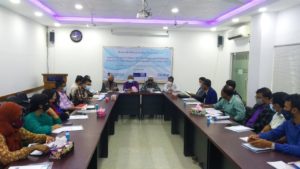
Dissemination of the findings of a study
Tobacco Companies are selling cigarettes to the retailers at MRP Leading to tax evasion worth 5 thousand crores each year
Even though all products in the markets are sold at the maximum retail price (MRP) across the country, the manufacturers are not following it in the case of cigarettes and bidis. Cigarette companies are selling cigarettes to retail sellers at MRP, and sellers are then selling cigarettes to general consumers at higher prices. Cigarettes are being sold at a much higher price than the maximum price mentioned on the packet almost everywhere. If it was possible to collect tax on the price customers have to pay in retail shops, the revenue income of the government would have been around Tk 5,000 crore in the current fiscal year. Tobacco manufacturing companies have been evading significant sums of money from the sale of tobacco goods in this manner, year after year.
These findings have come up in a recent study titled, “Impact of Price and Tax Changes in the National Budget on the Wholesale and Retail Prices of Tobacco Products (Cigarette and Bidi): A cross sectional survey.” The results of this study were jointly released by the Bureau of Economic Research (BER) and Bangladesh Network for Tobacco Tax Policy (BNTTP) in an event organized in BER’s conference room at the Arts Building of Dhaka University on Sunday, February 27, 2022, at 10:30 am. The keynote address regarding the study was presented by Dr. Rumana Haque who is a professor at the Department of Economics, University of Dhaka.
While presenting the results of the study, she mentioned that the data obtained from the field level showed that though the MRP of 20 stick packs of premium tier cigarettes printed on the packaging is BDT 270, but they are sold at an average price of BDT 294.29. Likewise, high tier cigarettes are being sold at an average price of around BDT 229.88 instead of BDT 204, middle tier cigarettes at BDT 135.86 instead of BDT 126 and low tier cigarettes at BDT 95.15 instead of BDT 78. Similar pricing trends were observed in case of bidis too. As a result, the government is losing thousands of crores of taka in revenue every year as cigarettes and bidis continue to be sold at prices higher than the maximum retail price.
The study also found that cigarettes and bidis are sold at higher prices than the retail price in wholesale shops too. This study was conducted following quantitative research methods. Data was collected from a total of 48 retail outlets (points of sale vendors) and 24 wholesale outlets from 12 cities/towns. This research area comprised of Dhaka, Barisal, Khulna, and Mymensingh divisional cities, as well as two extra district towns from each division. In each city, data was collected from a total of four retail outlets and two wholesale outlets. The retail shops were chosen from the public areas defined by the Usage of Smoking and Tobacco Products (Control) Act.
The study recommends that the government should introduce a specific tax system instead of the current ad valorem tax system to increase revenue and eliminate tax evasion. In addition, digital mechanisms should be introduced to monitor the market and sales of each product and to collect taxes; the four-tier tax structure for cigarettes needs to be consistently brought to one uniform level; the retail sale of single stick of cigarettes and bidis should be banned, as well as taking punitive measures to prevent tax evasion. Besides, a national tobacco tax policy needs to be formulated to address the overall problem of tobacco control and to build a tobacco-free Bangladesh by 2040.
The former chairman of the National Board of Revenue, Dr. Nasiruddin Ahmed; Program Head of Vital Strategies, Shafiqul Islam; National Professional Officer of World Health Organization, Syed Mahfuzul Haque; The Union’s Technical Advisor Syed Mahbubul Alam Tahin; The Union’s Technical Consultant. Hamidur Rahman Khan; General secretary of the Bangladesh Cancer Society, Golam Mohiuddin Farooq; CTFK’s Program Officer Ataur Rahman and Associate Professor of Economics at Dhaka University, SM Abdullah attended the event as special guest and expert discussant. Apart from them officials from various anti-tobacco organizations working in the country and several journalists were also present in the event and took part in a question and answer session on the research.

